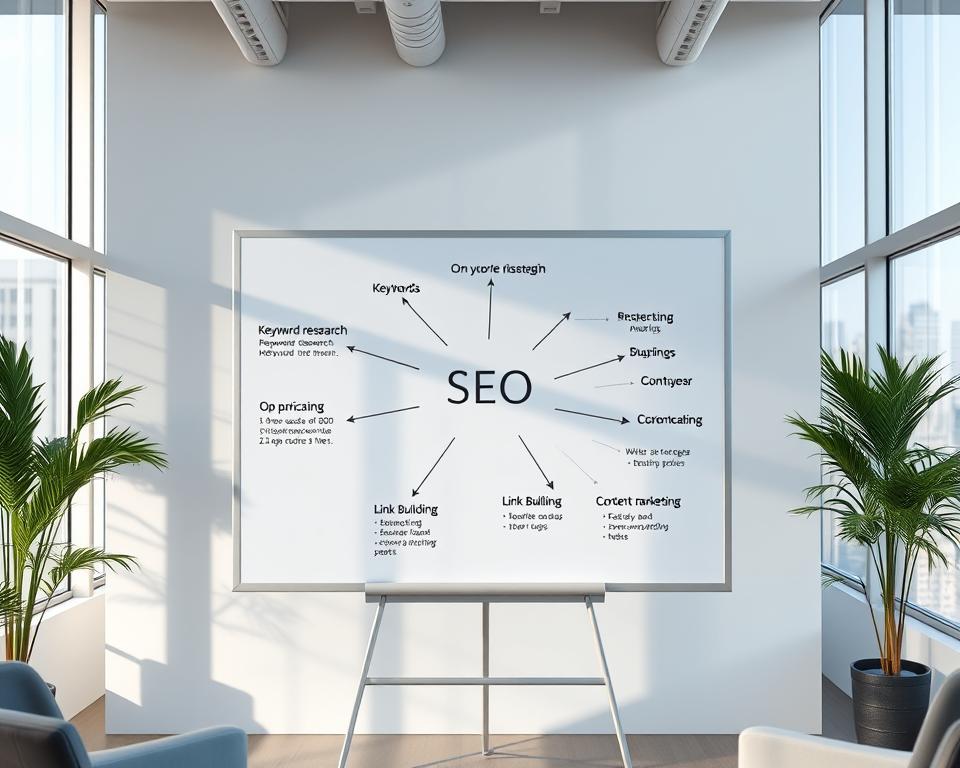1on1 Marketing: Reveal Customized Customer Engagement.
Ever stopped to think why certain brands click with their audience while others miss the mark? The answer is 1on1 Marketing, a revolutionary approach that transforms generic marketing into bespoke experiences. It focuses on individual tastes, creating a bond that traditional marketing can’t match. It repositions the focus from one-size-fits-all messaging to tailored tactics that talk directly to each customer’s core.
By adopting 1on1 Marketing, businesses can build more meaningful connections. They can craft marketing plans that truly resonate with their audience. Here, we explore the essence of 1on1 Marketing and how it allows brands to engage with customers on a personal level, 1on1.Marketing.
The Evolution of Marketing Strategies
Over time, the marketing landscape has experienced a major shift. At first, marketers relied on broad-brush strategies aimed at average customers. Today, the market demands a focus on customer engagement through tailored dialogues. This shift emphasizes the need to understand each customer as an individual, not just part of a group.
With marketing’s evolution, it’s clear that generic tactics fall short. Modern strategies aim to create meaningful interactions, building relationships instead of just pushing products. Marketers now use data insights to inform their approach, moving towards personalized tactics that meet unique customer needs.
Such evolution not only deepens customer bonds but also enhances loyalty and retention. In today’s choice-saturated market, brands offering personalized journeys shine. They create platforms for dialogue and engagement, ensuring customers feel valued.

| Strategy Type | Characteristics | Example |
|---|---|---|
| Generic Approach | Broad messaging, general appeal | Mass email blasts |
| Tailored Tactics | Customized dialogues, precision targeting | Custom product suggestions |
Personalization’s Role in B2B
As B2B marketing evolves, personalization is indispensable. Marketers aim to boost conversion rates through personalized 1:1 marketing. Research indicates that many view this as critical for retention. In a rapid-fire environment, engaging audiences effectively is vital.
Customization addresses the hurdle of capturing attention. It makes sure messaging aligns with each individual’s tastes. This focus on individual experiences helps brands stand out in crowded markets.
As touchpoints multiply, the demand for personalization grows. Brands that adopt personalized strategies meet customer needs and build lasting connections. Such an approach offers a competitive advantage in today’s market.
Understanding 1on1 Marketing
One-to-one Marketing centers on customizing experiences for each customer. It leverages data insights to design bespoke engagement tactics. This approach creates strong customer connections by focusing on individualized experiences.
Imagine a cafe where the barista recalls your go-to order—this is one-to-one Marketing in action. This simple gesture shows how attending to preferences drives satisfaction. It transforms a routine purchase into a memorable experience, enhancing loyalty.
To implement one-to-one marketing, companies must deeply understand customer data. They analyze behaviors and preferences to tailor their messages. This ensures their marketing efforts connect with individual tastes, leading to stronger customer connections and higher satisfaction.
As companies pursue personalized engagement, they recognize that customization underpins lasting success. Those mastering bespoke experiences gain substantial rewards.
Why Personalized Engagement Pays Off
Personalized customer engagement brings numerous benefits to modern brands. It significantly boosts customer satisfaction by providing tailored experiences that meet individual preferences and needs. Studies show that 80% of consumers prefer to buy from brands that offer personalized interactions. This highlights the significant impact of customized marketing.
Loyalty programs that incorporate personalization tend to retain customers better. By targeting distinct pain points and tastes, companies foster a sense of being valued. This link encourages repeat business, increasing profits.
Personalized marketing also leads to higher conversion rates. Custom suggestions and targeted messaging steer customers from consideration to purchase. Highlighting the benefits of personalized marketing enhances brand perception and positions businesses for success in a competitive market.
| Benefit | Description | Impact |
|---|---|---|
| Happy Customers | Personalized experiences improve overall customer happiness. | Increased chances of repeat purchases. |
| Loyalty Programs | Custom offers boost customer engagement. | Enhanced retention and brand loyalty. |
| Sales Upsurge | Targeted content drives customer actions effectively. | Boost in sales and revenue. |
Hurdles to Personalized Marketing
Implementing tailored marketing presents several challenges. One major challenge is the complexity of data collection. High-quality data is key for segmenting audiences effectively. Without it, marketers struggle to craft messages that truly resonate, leading to missed opportunities and inefficient campaigns.
Brands targeting specific audiences must navigate the fine line between personalized and generic communication. Large corporations often find it hard to maintain one-to-one interactions while heavily relying on automation. This can result in losing the personal touch that customers cherish. – 1 on 1 Marketing1 on 1 official company website
Smaller businesses also have their own set of challenges. They may lack clear messaging, hindering their personalization efforts. Recognizing these challenges is essential for marketers aiming to improve their strategies and engage customers more effectively.
Tools Fueling Personalized Marketing
Groundbreaking technologies in marketing are reshaping the realm of personalized customer engagement. Customer Relationship Management (CRM) systems stand out as a key component. They organize data, essential for crafting bespoke experiences. A robust CRM system allows companies to grasp customer preferences and behaviors more deeply.
AI in marketing improves personalization by enabling more accurate targeting and automating tasks. Machine learning algorithms sift through vast datasets to uncover trends and consumer behaviors. This allows strategy refinement. Automation reduces manual effort and heightens campaign impact.
Research shows 72% of marketers rely on CRM for personalization. Marketing automation tools are used by 55% to streamline campaigns. These tools enable large-scale customization. They ensure campaigns connect with individuals rather than broad audiences.
The integration of these technologies in marketing fosters a more dynamic approach to customer engagement. The rapidly changing landscape prompts marketers to embrace advanced tools. These tools not only improve efficiency but also strengthen connections with their audiences.
Top Tips for Effective Personalization
Successful personalization rests on core best practices. These ensure that efforts resonate with the audience, leading to better engagement. The core elements include:
- Segmenting Your Audience is essential for targeting specific groups based on common traits. It enables precision messaging, increasing engagement rates.
- Using refined communication enhances the customer experience. Uniform, relevant messaging across platforms builds trust and fosters ongoing engagement.
- Adopting testing strategies, like A/B testing, is critical. It identifies the most effective tactics by comparing messages and metrics.
Leveraging customer data is crucial to grasp behaviors and preferences. Regular analysis refines strategies. By adhering to these best practices, brands can craft a personalized approach that resonates with their target audience.
Creative Ways to Personalize
Innovative tactics enhance personalization across all touchpoints. Companies send emails tailored to tastes, amplifying impact. Analyzing purchase history allows spot-on product suggestions, increasing sales.
Segment-specific videos are another effective tactic. They capture attention and forge emotional bonds with viewers. Also, loyalty programs that evolve with user habits offer rewards for meaningful interactions, enriching the customer journey.
| Creative Tactic | Description | Benefit |
|---|---|---|
| Tailored Emails | Emails crafted to individual preferences and behaviors. | Increases engagement and conversion rates. |
| Product Recommendations | Suggestions based on previous purchases and browsing history. | Boosts sales and customer satisfaction. |
| Segmented Videos | Video content designed for specific segments. | Deepens brand connection and engagement. |
| Adaptive Rewards | Rewards systems that adapt to individual behaviors. | Increases loyalty and repeat business. |
Companies gain significantly by weaving customized offers into social media, email, and app alerts. Each interaction is a chance to show the brand’s dedication to personalized marketing. This creates unforgettable experiences that help the brand stand out in a busy market.
Future Trends in 1on1 Marketing
The world of 1on1 marketing is rapidly changing, driven by the latest marketing trends. AI will fuel campaigns tailored to individual requirements. It enhances campaign outcomes and strengthens connections by delivering timely, relevant content.
Another key trend is the importance of omnichannel experiences. Consumers expect seamless transitions across social, email, and other channels. Brands must ensure consistent messaging to meet these expectations. Understanding where and how customers interact helps create a unified experience, strengthening brand loyalty.
Adapting to these shifts, ethical data practices will become essential for maintaining trust with consumers. Amid rising privacy concerns, transparency and responsibility in data handling are non-negotiable. Focusing on ethical data usage not only meets regulatory standards but also builds stronger customer relationships, leading to increased loyalty in the future of 1on1 marketing.


